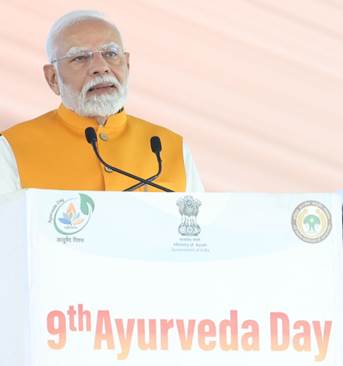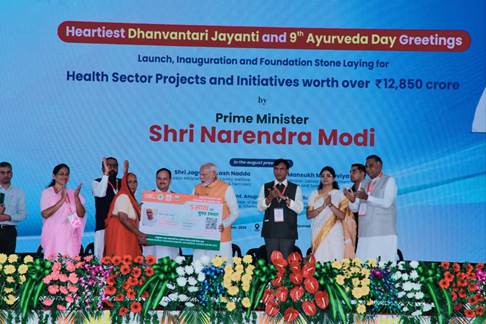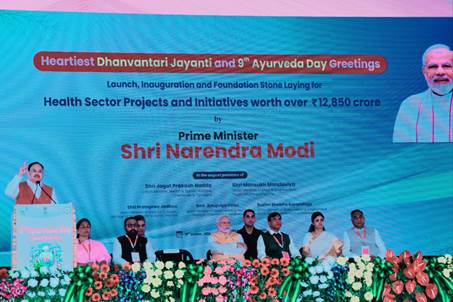In a landmark development aimed at strengthening India’s healthcare infrastructure and providing quality healthcare services across the country, Prime Minister Shri Narendra Modi inaugurated and laid the foundation stone of several health infrastructure projects, and launched various health programmes across the Ministry of Health & Family Welfare, Ministry of Ayush, Dept. of Pharmaceuticals, Ministry of Chemicals & Fertilizers, and Employees’ State Insurance Corporation (ESIC) under Ministry of Labour & Employment at an event at All India Institute of Ayurveda (AIIA), here today. The total outlay of these projects amounts to more than 12,855 cr.
Union Minister of Health and Family Welfare, Shri Jagat Prakash Nadda; Union Minister of Labour and Employment, Dr. Mansukh Mandaviya; Union Minister of State (Independent Charge) for AYUSH and Union MoS for Health and Family Welfare, Shri Prataprao Jadhav; Union Minister of State for Health and Family Welfare, Smt. Anupriya Patel; Union Minister of State for Labour and Employment, Smt. Shobha Karandlaje and Shri Ramvir Singh Bidhuri, South Delhi MP (Lok Sabha) were also present on the occasion.
Today marks 9th ‘Ayurveda Day’, which is celebrated in India and many other countries on the occasion of Dhanvantari Jayanti. It is a day to celebrate the birth of Lord Dhanvantari, God of Ayurveda. Quoting sages and saints, Prime Minister emphasized that “health is regarded as the greatest wealth, a concept that is gaining global recognition through Yoga”. He expressed joy that Ayurveda Diwas is now celebrated in over 150 countries, highlighting the increasing global interest in Ayurveda and India’s ancient contributions to the world.
Prime Minister said that in the past decade, the country had witnessed beginning of a new chapter in the health sector with amalgamation of knowledge of Ayurveda with Modern medicine, adding that the All India Institute of Ayurveda had been a focal point of this chapter. He noted that it would be possible to see ancient techniques like Panchakarma infused with modern technology in this institute along with advanced research studies in the fields of Ayurveda and medical science.

Prime Minister underscored that “a nation’s progress is closely linked to the health of its citizens”, outlining the government’s commitment to healthcare through five key pillars: preventive healthcare, early disease detection, affordable treatment and medications, increased doctor availability in smaller towns, and technological advancements in health services. He stated that India’s approach to health is holistic and highlighted recent projects worth over ₹13,000 crores, including four Centers of Excellence under the Ayush Health scheme, drone service expansions, new infrastructure at various AIIMS, and the establishment of medical colleges. He expressed satisfaction with hospitals being built for laborers, which will serve as dedicated treatment centres. The inauguration of pharmaceutical units aimed at manufacturing advanced medicines and quality stents and implants was also mentioned.
Reflecting on the struggles many families face due to illness, especially in poorer households, Shri Modi noted that people previously had to sell their possessions for medical care. He said that “to alleviate this burden, the government introduced the Ayushman Bharat Yojana, which covers up to ₹5 lakh in hospitalization costs for the poor”. He highlighted that around 4 crore individuals have benefited from this scheme, ensuring that they receive treatment without financial strain. He expressed pride in expanding the Ayushman Yojana to include free treatment for all citizens over 70 years old, through the Ayushman Vaya Vandana Card, which is universally accessible regardless of income.

Reiterating the focus on reducing healthcare costs for both the poor and middle class, Prime Minister noted launch of over 14,000 Jan Aushadhi Kendras, providing medicines at an 80% discount and saving citizens ₹30,000 crores. He highlighted reductions in the prices of medical devices like stents and knee implants, preventing a loss of over ₹80,000 crores for the public. He also mentioned the free dialysis scheme and the Mission Indradhanush yojana, aimed at preventing severe diseases and protecting mothers and newborns.
Prime Minister emphasized the importance of timely diagnosis to mitigate health risks and mentioned the establishment of nearly two lakh Ayushman Arogya Mandirs, facilitating early detection of diseases like cancer and diabetes. He noted that these centres help millions access timely treatment, ultimately reducing costs. Additionally, the government is leveraging technology through the e-Sanjeevani scheme, which has enabled over 30 crore online consultations, significantly lowering healthcare expenses. He announced the launch of the U-win platform, enhancing access to health services in India by providing citizens with secure digital identities. The Made-in-India digital platform will benefit 2.9 crore pregnant women and 2.6 crore infants annually by fully digitalising the complete vaccination process. It will ensure the timely administration of life-saving vaccines to women and children (from birth to 16 years) against 12 vaccine-preventable diseases under the Ministry of Health and Family Welfare’s flagship Universal Immunization Programme (UIP).
Prime Minister concluded his address by reflecting on the substantial progress in India’s healthcare over the last decade compared to the previous decades, noting the record establishment of new AIIMS and medical colleges. He cited recent inaugurations in states like Karnataka, Uttar Pradesh, Madhya Pradesh, and Andhra Pradesh, as well as new medical colleges being developed. He assured that the increasing number of hospitals correlates with a rise in medical education opportunities, promising that no child’s dream of becoming a doctor would be hindered by lack of options in India, with nearly 1 lakh new MBBS and MD seats added in the past decade and a commitment to announce an additional 75,000 seats in the next five years.
Speaking on the occasion, Shri JP Nadda said, “the health policy presented today by Prime Minister Shri Narendra Modi has two special features. The first characteristic is that it is holistic; In this, all aspects of preventive, promotional, curative, rehabilitative and palliative have been taken care of. The second feature is that the effort made in bringing all the genres together under one roof is very significant and will always be remembered.”

He also reiterated that the Union Government will provide a health cover of ₹ 5 lakh to any elderly person above 70 years of age, any woman, any caste, any community, and any area, and will make arrangements for their treatment free of cost, adding that this facility will be available throughout their life.
Shri Prataprao Jadhav noted that since 2014, Ayurveda’s involvement in global health has gained a new dimension and credited the Prime Minister for his exemplary contribution towards this. He informed that ‘Support Ayurveda’ initiative has been launched with the aim of spreading global awareness of Ayurveda.
Details of Projects:
Various projects and facilities falling under the Union Health Ministry amounting to more than Rs. 1133 Cr were inaugurated by the Prime Minister today. These include three Medical Colleges at Mandsaur, Neemuch and Seoni in Madhya Pradesh; facility and service extensions at AIIMS in Bilaspur (Himachal Pradesh); Kalyani (West Bengal), Patna (Bihar), Gorakhpur (Uttar Pradesh), Bhopal (Madhya Pradesh), Guwahati (Assam), and New Delhi where a Jan Aushadhi Kendra was inaugurated; a Super Speciality Block in Government Medical Colleges at Bilaspur (Chhattisgarh); a Central Drugs Testing Laboratory (CDTL) in Gothapatna, Bhubaneswar, Odisha and a Critical Care Block in Bargarh, Odisha.
In addition, Prime Minister laid the foundation stone for various health infrastructure projects amounting to more than Rs. 925 cr. These include five Nursing Colleges in Madhya Pradesh (Shivpuri, Ratlam, Khandwa, Rajgarh, and Mandsaur); 21 Critical Care Blocks in states of Himachal Pradesh, Karnataka, Manipur & Tamil Nadu, and Rajasthan under PM-ABHIM; and several facilities and service extensions at AIIMS, New Delhi and AIIMS Bilaspur, Himachal Pradesh.
With the aim of enhancing access to health services in India by providing citizens with fully digitalized immunization services for pregnant women and children and secure digital identities, Prime Minister launched the U-WIN portal today. This Made-in-India digital platform will benefit 2.9 crore pregnant women and 2.6 crore infants annually by fully digitalizing the complete vaccination process. It will ensure the timely administration of life-saving vaccines to pregnant women and children (from birth to 16 years) against 12 vaccine-preventable diseases. As a major addition to the flagship scheme AB PM-JAY, Prime Minister launched expansion of health coverage to all senior citizens aged 70 yrs and above, regardless of their income, at a cost of Rs. 3437 crores.
To extend the reach of healthcare services to hard-to-reach areas, Prime Minister launched drone services at 11 Tertiary Care Institutions. These are AIIMS Rishikesh (Uttarakhand), AIIMS Bibinagar (Telangana), AIIMS Guwahati (Assam), AIIMS Bhopal (Madhya Pradesh), AIIMS Jodhpur (Rajasthan), AIIMS Patna (Bihar), AIIMS Bilaspur (Himachal Pradesh), AIIMS Raebareli (Uttar Pradesh, AIIMS Raipur (Chhattisgarh), RIMS Imphal (Manipur) and AIIMS Mangalagiri (Andhra Pradesh). A Helicopter Emergency Medical Services from AIIMS Rishikesh was also launched which will help to deliver speedy medical care by stabilizing and treating trauma victims during flight and onsite. It will cover Uttarakhand and nearby areas within 100 nautical miles. In addition, Prime Minister launched a portal for Allied Healthcare professionals and institutes. This is a centralized database of existing Allied and Healthcare Professionals and institutes. Moreover, State specific Action Plan on Climate Change and Human Health (SAPCCHH) for each State and UT was also launched, which lays out adaptation strategies towards developing climate resilient healthcare services in these States/UTs.
Under the Dept. of Pharmaceuticals, five projects under Production Linked Incentive (PLI) scheme for Medical Devices and bulk drugs was inaugurated at Vapi (Gujarat); Sultanpur, (Hyderabad); Bengaluru, (Karnataka); Kakinada (Andhra Pradesh) and Nalagarh (Himachal Pradesh). These units will manufacture high-end medical devices, such as body implants and critical care equipment, along with important bulk drugs like Penicillin-G and Clavulanic Acid. These initiatives support India’s goal of reducing import dependence and enhancing local manufacturing capabilities in medical devices and bulk drugs. Prime Minister also laid the foundation stone of four Centres of Excellence at NIPER –Ahmedabad (Gujarat) for Medical Devices; NIPER Hyderabad (Telangana) for Bulk Drugs; NIPER, Guwahati (Assam) for Phytopharmaceuticals; and NIPER – Mohali (Punjab) for Anti-Bacterial Anti-Viral Drug Discovery and Development. The total outlay for the Dept. of Pharmaceutical projects is about Rs. 5187 crores.
In addition, under Ministry of Labour and Employment, Prime Minister inaugurated a 300 bedded ESIC Hospital which is upgradable to 500 beds at Indore (Madhya Pradesh), and laid the foundation stone for various ESI Hospitals across Faridabad (Haryana), Bommasandra (Karnataka) & Narasapur, Indore (Madhya Pradesh), Meerut (Uttar Pradesh), and Atchutapuram (Andhra Pradesh) at a cumulative cost of Rs 1641 crores. These projects will bring healthcare benefits to 55 lakh ESI beneficiaries.
Under the Ministry of AYUSH, Prime Minister inaugurated Phase II of the All India Institute of Ayurveda (AIIA), originally dedicated in 2017, which includes a 150-bedded Panchakarma hospital, an Ayurvedic pharmacy, a sports medicine unit, and extensive accommodation facilities, all at a cost of over ₹289 crores. To enhance India’s health and wellness solutions, he also laid the foundation for two Central Research Institutes in Yoga and Naturopathy in Odisha and Chhattisgarh, and launched four Centers of Excellence focused on diabetes research, sustainable Ayurvedic solutions, Ayurvedic botanical research, and systems medicine for rheumatoid arthritis. Additionally, a nationwide health awareness campaign, “Desh Ka Prakriti Parikshan Abhiyan,” was launched with 470,000 volunteers, aiming to revolutionize public health awareness and attempt multiple Guinness World Records.

Comments are closed.